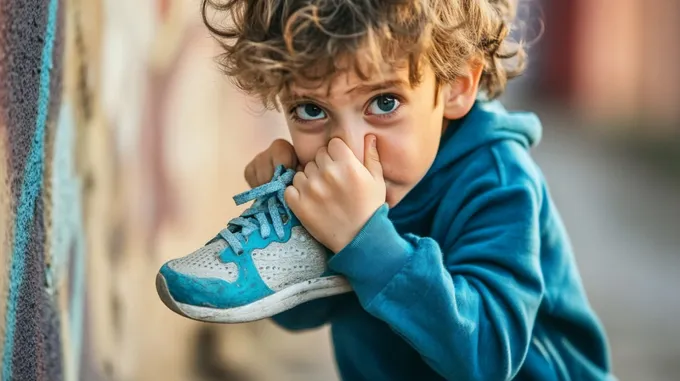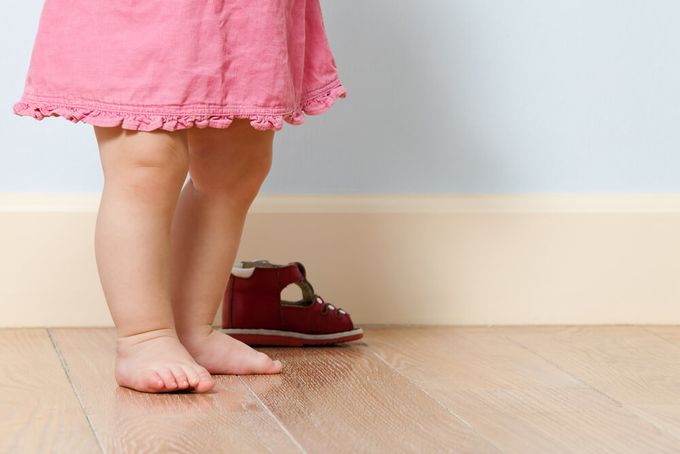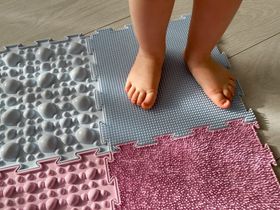Why Do My Baby's Feet Smell? Podiatrist-Backed Answers
Baby foot odor is caused by sweat and bacteria thriving in warm, moist environments, often worsened by tight shoes and synthetic materials that trap moisture. Prevention includes proper foot hygiene, breathable footwear with good ventilation, and more.
Updated September 12, 2025

As loving parents, our top priority is that our babies are happy, healthy, and comfortable, from top to toe. But, sometimes, we might encounter issues like baby feet smell, even in 2-month-old, 3-month-old, or 6-month-old babies.
While it may seem unpleasant, it’s actually a widespread issue among young children. While it may seem unpleasant, this is a common issue among young children.
Let's explore the reasons behind this and discover practical solutions to keep those feet fresh and happy.
Why Do Babies' Feet Smell?
There are two primary reasons your baby's feet might be smelly:
The Role of Sweat and Bacteria
Whether it’s a newborn or a 3-month-old baby, foot odor is primarily caused by a combination of sweat and bacteria [1]. As your baby grows, you may notice the same issue at 6 months or beyond, especially once they start wearing socks and shoes regularly.
These bacteria thrive in warm, moist environments and break down sweat, causing the characteristic "cheesy" foot smell.
The Impact of Shoes and Socks
The problem is often exacerbated by limited air circulation around the baby's feet. Prolonged wear of socks and shoes, especially those made from synthetic materials, traps moisture and heat.
As babies' feet grow quickly, shoes that once fit well may become tight, further restricting airflow and increasing sweat production.
It's also important to note that genetics and metabolism can influence how much a child sweats and, thus, the level of foot odour.
How to Get Rid of Smelly Feet in Babies
Home Remedies & Foot Care
If you notice a less-than-pleasant smell coming from your baby's feet, consider using a diluted vinegar foot soak or tea tree oil solution [2]. These natural ingredients have antibacterial and anti-fungal properties that can help freshen delicate skin.
You can begin with a very diluted mixture and gradually increase the concentration if needed. Always test a small area of skin first to check for irritation. Avoid these remedies if your baby's skin is already red, dry, or cracked.
Drying their feet is as important as washing them because moisture between the toes encourages bacterial growth. Gently dry their feet after baths or washes, especially in the areas between the toes. Avoid using baby powder, as some varieties contain irritants.
When to Consult a Doctor
If you have persistent odour or skin concerns, speak to your paediatrician. They can provide tailored advice and rule out any underlying issues, such as hormonal imbalances or diabetes.
Choosing the Right Shoes to Prevent Foot Odor
When choosing footwear, look for the following features:
- Look for Breathable Materials: Canvas, mesh, and leather are good options for air circulation, while synthetic materials should be avoided as they trap moisture.
- Focus on Proper Sizing and Ventilation: The shoe's design plays a crucial role, with ventilation holes or perforations helping to keep feet dry. Open designs like sandals can be appropriate in warmer weather to for airflow, and the strap around the ankle provides extra support.
- Moisture Wicking: These properties are essential for combating odour. Look for shoes with moisture-wicking linings and removable, washable insoles to help keep feet dry.
- Proper Sizing: Shoes that fit well with room for growth allow for better air circulation and prevent excessive sweating. A snug fit can trap moisture, leading to sweaty feet. There should be about a thumb's width of space between your baby's toes and the end of the shoe.
First Walkers' shoes are podiatrist-designed to include breathable materials like soft leather and feature a wider fit to allow for better air circulation, which is crucial for preventing sweat buildup and odor.
Essential Shoe Care and Maintenance Tips
Maintaining good foot hygiene is essential for overall foot health, so start each day with clean feet and fresh cotton socks. Make sure to change your kid's socks regularly throughout the day, especially after physical activity or if they become damp.
Switch between at least two pairs of shoes to prevent the buildup of bacteria. This gives them enough time to dry out entirely. While it can help kill some bacteria, sun exposure can damage certain materials. Instead, air-dry shoes in a well-ventilated area.
Tip: Stuffing shoes with newspaper can help absorb moisture, but remember to replace them frequently.
Nipping Nasty Niffs in the Bud
Tackling foot odour is not only possible but also essential for your baby's comfort, and the right shoes can make all the difference.
Luckily, you don't have to sacrifice style for function. While hygiene is key, the right footwear is the ultimate solution to preventing stinky feet.
First Walkers' collection of sandals and shoes is not only adorable but is also designed by podiatrists with superior ventilation and soft, chafe-free materials to keep your baby's feet dry, healthy, and happy.
References:
- N. Website, “Smelly feet,” nhs.uk, Jul. 25, 2025. Available: https://www.nhs.uk/symptoms/smelly-feet/
- D. Ousaaid, H. Laaroussi, M. Bakour, H. Ennaji, B. Lyoussi, and I. E. Arabi, “Antifungal and antibacterial activities of apple vinegar of different cultivars,” International Journal of Microbiology, vol. 2021, pp. 1–6, Aug. 2021, doi: 10.1155/2021/6087671. Available: https://pmc.ncbi.nlm.nih.gov/articles/PMC8369171/
Disclaimer: First Walkers' information is intended for educational and informational purposes related to toddler footwear and feet. We encourage you to consider individual circumstances and consult qualified orthopaedists about specific conditions.
FAQs
Can baby powder stop stinky feet?
Yes. Baby powder helps absorb sweat and reduce moisture, which can limit odor, but it doesn’t treat the root cause.
Is stinky foot genetic?
Partly. Some people inherit sweat gland activity or skin bacteria tendencies that make foot odor more likely.
What medical conditions cause stinky feet?
Hyperhidrosis (excessive sweating), fungal infections like athlete’s foot, and certain metabolic disorders can cause strong foot odor.
What foods cause foot odor?
Spicy foods, garlic, onions, alcohol, and strong-smelling spices can contribute to foot odor through sweat.
Does baking soda stop smelly feet?
Yes. Baking soda neutralizes odor and reduces moisture, making it an effective home remedy.





